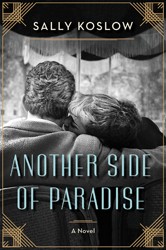The heroine of this novel by award-winning poet Alan Shapiro is Miriam, a Jewish girl with stardust in her eyes and a passion for Broadway musicals of the 1940’s. She especially reveres the character of Miss Julie from Jerome Kern’s musical Showboat and keeps a poster from the show over her bed, a diary in which she details every show she and her boyfriend, Curly, see, as well as every menu from every restaurant they frequent. After he is drafted, she enjoys describing herself as “a fiancée pining for her gorgeous soldier boy” in her diary. In actuality, she is relieved that he is away. For it is the idea of them as a couple she enjoys infinitely more than she enjoys actually making love with him. And we begin to notice that she seems to see everything in the third person, as if she and those around her were characters in a play she is viewing.
When she gives birth to a girl she names her Julie. But she doesn’t bond with her the way she did with the character’s namesake from Showboat. And when she has two more children, both sons, Ethan and Sam, and they all sit together in her rocking chair one evening, she sings “Lullaby of Broadway” to them while thinking, “Someone should take a picture of this, what a picture we’d make…”
Gradually we begin to realize that Miriam is disconnected from herself and others and this has tragic consequences for her and her family. Situations which seem unimportant occurrences to her, when ignored, become monumental drawbacks. Ethan’s bed-wetting, because it is neglected, lasts so long that he can’t attend camp or a sleepover, even as a teenager, for fear of embarrassment. Julie’s lack of interest in communicating with her mother is never dealt with, as Miriam’s narcissism makes her retaliate by not interesting herself in her daughter. And Sam’s annoyance at having to spend long hours “babysitting” his grandmother, which is convenient for Miriam, has repercussions as well.
The posters from South Pacific and Showboat remain on the wall while her children grow up. Their presence fuels Miriam’s desire to promote Ethan’s singing talent so he can become the star in the family. Yet, no matter what successes each child has, they are never satisfying enough for Miriam.
A strange kind of justice is served Miriam. As things spiral downward, the story evokes chills and even horror — a far cry from the optimistic mood at the beginning of this compelling novel.




